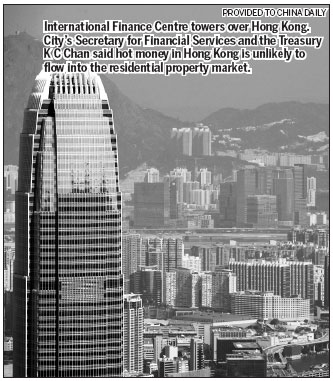Hot money unlikely to lift home prices: KC Chan
Updated: 2012-12-15 07:00
By Oswald Chen and Sophie He(HK Edition)
|
|||||||

Inflow forces HKMA to inject HK dollars into market to keep stability
Hot money that has been flowing into Hong Kong recently following the Federal Reserve's new quantitative easing moves is unlikely to find its way into the local housing market, said Secretary for Financial Services and the Treasury KC Chan.
As the US Federal Reserve launched its fresh bond-buying stimulus program (QE4), concerns have been raised that the hot money inflows will be accelerated, and continue to push up asset prices in Hong Kong.
There is indeed a large amount of capital flowing into Hong Kong, especially during the latest month, Chan told a press briefing in Hong Kong on Friday, adding that the Hong Kong Monetary Authority (HKMA), the city's de facto central bank, had stepped up its intervention by injecting Hong Kong dollars into the market to keep its stability.
"But I believe the possibility for these external capital to flow into the residential property market (in Hong Kong) is very low," said Chan, explaining that the Buyer's Stamp Duty (BSD), which was implemented in October, will significantly reduce foreign investors' desire to buy properties in the city.
The Hong Kong government on Oct 26 unveiled its toughest efforts yet to curb home prices, by imposing a 5-percent rise in punitive stamp duties - ranging from 10 to 20 percent on short term home resales within a three-year period, and an additional unprecedented 15 percent BSD on home purchases by companies and non-Hong Kong permanent residents.
Real estate analysts also agreed that the recent capital inflows should not provoke property price surges in the city.
Recent capital inflows are mainly targeting at the anticipated yuan currency appreciation and it does not target the local property market since it is not a liquid asset," Centaline Property Agency Research Director Wong Leung-sing told China Daily.
"Even with the recent capital inflows into the Hong Kong financial system, we do not see a sudden increase in home transactions," Wong added.
However, capital inflows into the city will flood the city's financial system with abundant liquidity weighing on the city's interbank rates to make it lower, thus pushing the already-low mortgage rates in the city to even lower rates, and may offset the effectiveness of the government's anti-speculative measures, he reckoned.
Patrick Chow, head of research at Ricacorp Properties, begged to differ. "Those overseas capital may not target at the local home market in the first instance," Chow told China Daily. "When the local share market and other asset markets are buoyed by capital inflows, it may eventually spur local home price to surge."
Norman Chan Tak-lam, chief executive of HKMA, told media on Friday during his visit in Beijing that the increasing scale of the US' quantitative easing will lead to more pressure on Hong Kong's inflation as well as the asset market.
Chan said he expects that the US Federal Reserve will consider withdrawing from the market by 2015, and the capital may start to flow out of Hong Kong by then.
The longer and larger scale of the quantitative easing, the harder and higher risks will be for the US Federal Reserve to withdraw from the market in the future, he said.
Contact the writers at oswald@chinadailyhk.com and sophiehe@chinadailyhk.com
(HK Edition 12/15/2012 page2)